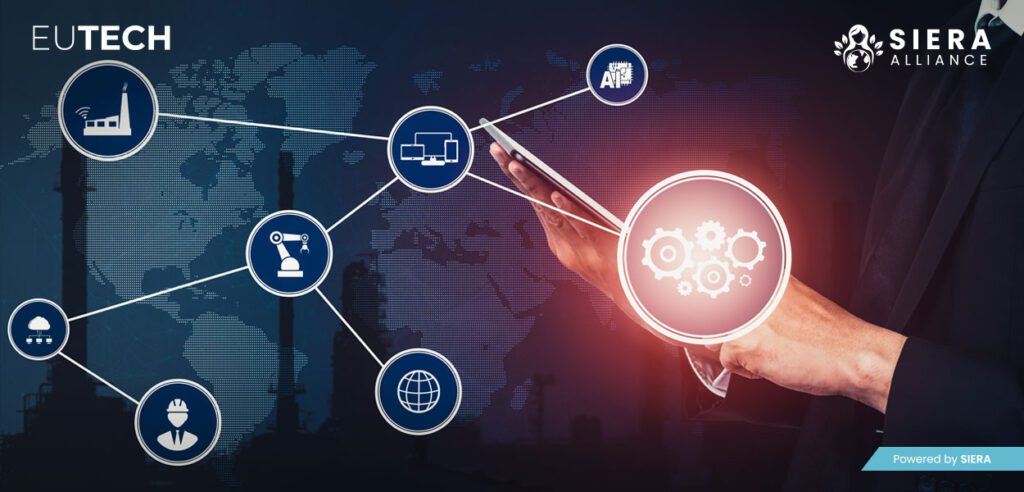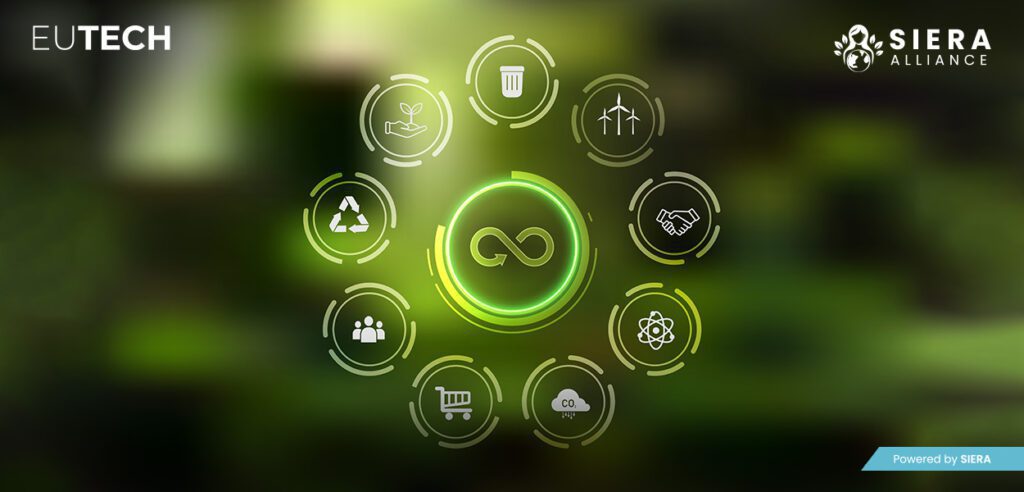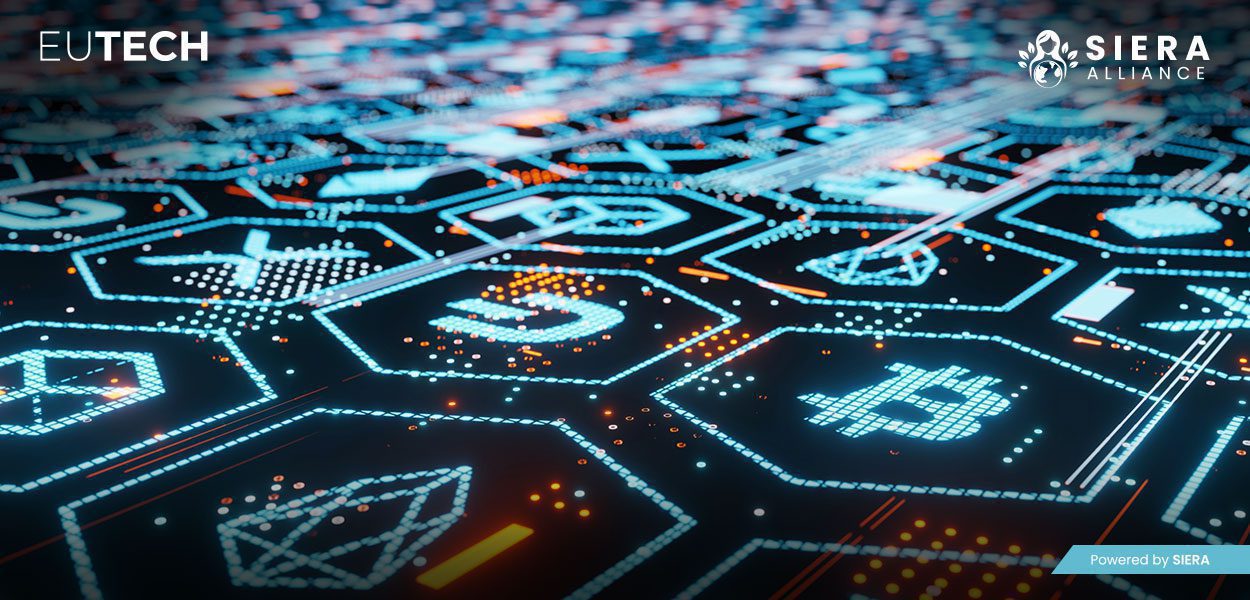On 29th January 2025, the EUTECH – Financial Services Council powered by SIERA Alliance hosted an engaging and forward-thinking webinar titled “Digital Currencies: A New Component for Circular Business Models.” The session provided a platform for industry leaders to explore how digital currencies can act as powerful enablers in the transition to circular economies. Sarah Kasap, SIERA Advisors, shared insights on the role of digital currencies in supporting sustainable business practices and boosting resource efficiency. Premesh Premji, Senior Manager at Synechron, added further depth to the discussion, focusing on how blockchain technology and digital currencies can be integrated with circular business models to promote environmental sustainability while driving economic growth. The conversation highlighted the transformative potential of digital currencies in fostering innovation and creating a more sustainable future for businesses across industries. Additionally, the webinar addressed how aligning with frameworks like ESRS E5—which focuses on environmental, social, and governance (ESG) disclosures—can help integrate digital currencies into sustainability strategies and circular business practices.

Key Challenges in Integrating Digital Currencies into Circular Business Models
The integration of digital currencies into existing financial systems and circular business models presents several challenges. The panelists identified critical hurdles that need to be overcome:
- Energy-Intensive Blockchain Technology: Many digital currencies rely on blockchain technology, which, particularly in proof-of-work systems, is energy-intensive. The mining process consumes significant energy, contributing to carbon emissions and undermining sustainability goals. It’s essential to transition to renewable energy sources to power blockchain networks, reducing their carbon footprint.
- Regulatory Compliance and Uncertainty: The regulatory landscape for digital currencies remains fragmented across regions. Compliance with regulations like anti-money laundering (AML), combating the financing of terrorism (CFT), and tax implications presents substantial challenges. A robust regulatory framework is needed to ensure long-term stability and align digital currencies with circular economy practices.
- Interoperability Between Systems: Blockchain networks need to integrate seamlessly into existing financial infrastructures. However, the lack of uniformity in technological standards poses barriers to efficient transaction processing. Solutions such as digital twins can help address these gaps by simulating real-world scenarios and enhancing system compatibility.
- Cybersecurity and Data Privacy: The decentralized nature of digital currencies introduces vulnerabilities in cybersecurity. Blockchain technologies, while transparent, can expose sensitive transaction data, raising concerns about data privacy and trust. Strong encryption and privacy-preserving technologies are essential for ensuring secure and confidential transactions.
- User Adoption and Awareness: Despite the potential of digital currencies to enhance sustainability, many stakeholders lack the knowledge or familiarity with these technologies. Increased education and awareness are needed to drive adoption and ensure these technologies are widely embraced.
Practical Solutions and Recommendations
To address these challenges, the panelists proposed several actionable solutions for integrating digital currencies into circular business models:
- Utilizing Renewable Energy for Blockchain Networks: As blockchain operations are energy-intensive, transitioning to renewable energy sources like solar and wind can significantly reduce their carbon footprint, aligning digital currencies with sustainability goals. This shift also enhances public perception of digital currencies as environmentally responsible.
- Establishing Robust Regulatory Frameworks: Financial institutions must implement clear regulatory frameworks to manage risks and ensure compliance. By aligning digital currencies with sustainability regulations, businesses can reduce fraud risks, enhance transparency, and foster trust among stakeholders.
- Leveraging Digital Twins for System Optimization: Digital twins, virtual replicas of physical systems, can be used to simulate and optimize the integration of digital currencies in circular business models. This technology helps businesses identify potential challenges and streamline operations before full-scale implementation.
- Investing in Advanced Environmental Technologies: Integrating energy-efficient hardware, green computing systems, and innovative cooling mechanisms into blockchain operations can help mitigate the environmental impact. These technologies not only reduce operational costs but also contribute to meeting sustainability targets.
- Collaborating with Smart Cities: Incorporating digital currencies into smart city projects can demonstrate the practical value of these technologies in driving sustainability. By enabling micro-payment systems for energy-sharing or waste management, digital currencies can improve urban living while supporting circular economies.

Transformation Opportunities in Circular Business Models
The adoption of digital currencies offers transformative opportunities for businesses looking to enhance their circular business models and align with sustainability goals:
| Transformation Area | Benefits | Impact |
| Enhanced Reputation | Positioning as a leader in sustainable innovation | Companies prioritizing green digital currencies experience a 15% increase in market share. |
| Operational Efficiency | Reduces operational costs through efficient transaction processing | Blockchain-powered systems can cut transaction costs by up to 25%. |
| Improved Trust | Fostering transparency through smart contracts and blockchain | Businesses with transparent digital currency operations see a 30% increase in investor trust. |
| New Revenue Streams | Creating new business opportunities in the circular economy | Implementing tokenization in circular projects increases revenue by 20%. |
Best Practices for Adopting Digital Currencies in Circular Business Models
To effectively implement digital currencies in circular business models, companies should adopt the following best practices:
- Regular Carbon Footprint Assessments: Tracking the carbon emissions associated with blockchain operations ensures ongoing improvement in sustainability.
- Incorporating ESG Metrics: Aligning digital currency operations with ESG criteria enhances corporate sustainability and boosts stakeholder confidence.
- Integrating Digital Currency Systems with Existing Platforms: Ensuring seamless interoperability between blockchain systems and traditional financial infrastructures fosters greater efficiency and transparency.
- Adopting Smart Contracts for Efficiency: Using smart contracts can automate transactions and compliance, reducing the need for intermediaries and cutting operational costs.
Upcoming Events and Opportunities
Stay updated on future events hosted by the Financial Services Council powered by SIERA Alliance. For further insights into digital currencies and sustainability in circular business models, explore the SIERA Alliance Event Calendar. Join us in driving innovation in digital finance and sustainability.
Conclusion: A Greener Future for Digital Currencies
As businesses continue to adopt digital currencies, there is significant potential to drive circular economies and sustainable business practices. By aligning digital currencies with sustainability goals, financial institutions can contribute to a greener, more efficient future. Collaborating with organizations like SIERA Alliance, EUTECH, and MuP Group enables firms to implement impactful solutions that benefit both the environment and the economy.
To learn more about how SIERA Alliance can support your journey towards sustainable business practices and digital currency adoption, explore our website. Join us in shaping a responsible and sustainable future for businesses.








